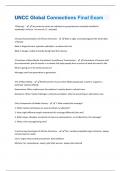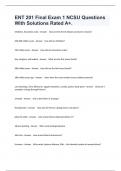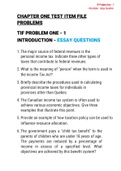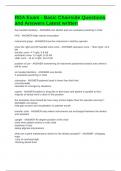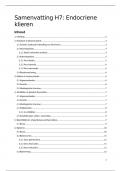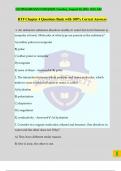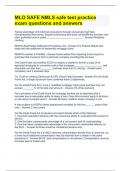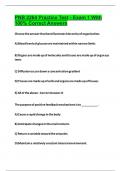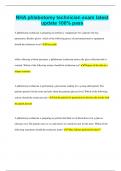sociology
education:)
,FUNCTIONALIST: MARXIST:
Emile Durkheim: Education helps produce social solidarity. School is like a Louis Althusser: ISA - education spreads the capitalist
miniature society and education teaches skills for future occupation. RSA helps maintain the rule of the capitalist for future occupation.
Especially important for modern industrialised societies of the specialised Especially important for modern class by force, e.g.: police/army.
division of labour.
Talcott Parsons: Education creates a bridge between the particularistic Bordieu: Education reproduces class inequality. Habitus = cultural formwork
values of the family and the universalistic values of society. Education gives possessed by a S.C. Ruling class impose their habitus on the education
secondary socialisation. system. The M.C are advantaged due to cultural capital.
Davis & Moore: Education's function is role allocation - right job for the right Bowles and Gintis: Education helps the reproduction of the structures found
person based on talent, ability and hard work. in schools mirror those found in the paid job. Correspondence principle -
The education system is meritocratic, where hard work = highly paid job relationships and structures found in schools mirror those in the workplace.
Hidden curriculum - informal learning that occurs outside the classroom.
Criticisms: Criticisms:
(Durkheim) - Many job skills are learnt on the job and passing down norms (Althusser) - Assumes the passive acceptance of capitalism
and values reproduces capitalist ideology and class inequality. (Bourdieu) - Not all the W.C do poorly in the education system
(Parsons) - Universalistic values of society are actually capitalist values, (Bowles&Gintis) - Assumes students passively accept the attitudes and
giving advantage to the M.C. behaviours taught in the hidden curriculum.
(Davis&Moore) - No equality of opportunity due to assuming education is a
meritocratic system.
, MATERIAL FACTORS: CULTURAL FACTORS:
Housing: Basil Bernstein - Linguistic codes:
Overcrowding = difficulty studying due to less space and disturbed sleep Restricted code - used by W.C - Limited vocab, short, unfinished sentences and descriptive.
Temporary accommodation = Moving around disrupts education Elaborated code - used by M.C - Extensive vocab, grammatically complex, conveys abstract
Cold/damp = ill health = absence ideas.
M.C are advantaged as ethnocentric curriculum is used in textbooks, exams and by teachers.
Diet and health: Parents education: Parenting style:
- Marilyn Howard (2001) - poorer homes = lower intakes of energy, vitamins and Higher educated parents = consistent discipline + high expectations = Support for active
minerals = weakened immune systems = absence from school. learning
- Richard Wilkinson (1996) - Poorer homes are more likely to face emotional/ Lower educated parents = harsh discipline that stops child learning independence and self
behavioural issues. E.g. - 10 year olds have increase anxiety and hyperactivity. control = less motivation
- Blanden and Machin (2007) - Low income families engage in externalising behaviours Parents education: Parents educational behaviour:
such as fighting and tantrums = disrupts schooling. - Higher educated parents - aware of what is needed - read books, sing songs and
paint with their children
- Recognise the educational value of school trips
- Have good teacher relations and guide children's interactions
Parents education: Use of income:
- M..C = Higher income = purchase educational books = stimulate intellectual
development
- W.C = Lower income = Lack of resources.
Finances of education: Barry Sugarman & W.C Subculture:
Emily Tanner et al (2003) - equipment, books, resources, uniform and transport are a burden on W.C suffer from cultural deprivation = different values than rest of society. Subculture values
poor families. include: fatalism, collectivism, immediate gratification, present time orientation
- cheaper equipment bought = could lead to bullying = isolation
Fear of debt:
Callender and Jackson (2005) - W.C students see uni debt as bad so they are 5x less likely to go
to university.
National Union of Students (2012) - Surveyed 3863 students and found 81% of students in a
high S.C received help from home. Compared to only 45% for those with a lower social class
education:)
,FUNCTIONALIST: MARXIST:
Emile Durkheim: Education helps produce social solidarity. School is like a Louis Althusser: ISA - education spreads the capitalist
miniature society and education teaches skills for future occupation. RSA helps maintain the rule of the capitalist for future occupation.
Especially important for modern industrialised societies of the specialised Especially important for modern class by force, e.g.: police/army.
division of labour.
Talcott Parsons: Education creates a bridge between the particularistic Bordieu: Education reproduces class inequality. Habitus = cultural formwork
values of the family and the universalistic values of society. Education gives possessed by a S.C. Ruling class impose their habitus on the education
secondary socialisation. system. The M.C are advantaged due to cultural capital.
Davis & Moore: Education's function is role allocation - right job for the right Bowles and Gintis: Education helps the reproduction of the structures found
person based on talent, ability and hard work. in schools mirror those found in the paid job. Correspondence principle -
The education system is meritocratic, where hard work = highly paid job relationships and structures found in schools mirror those in the workplace.
Hidden curriculum - informal learning that occurs outside the classroom.
Criticisms: Criticisms:
(Durkheim) - Many job skills are learnt on the job and passing down norms (Althusser) - Assumes the passive acceptance of capitalism
and values reproduces capitalist ideology and class inequality. (Bourdieu) - Not all the W.C do poorly in the education system
(Parsons) - Universalistic values of society are actually capitalist values, (Bowles&Gintis) - Assumes students passively accept the attitudes and
giving advantage to the M.C. behaviours taught in the hidden curriculum.
(Davis&Moore) - No equality of opportunity due to assuming education is a
meritocratic system.
, MATERIAL FACTORS: CULTURAL FACTORS:
Housing: Basil Bernstein - Linguistic codes:
Overcrowding = difficulty studying due to less space and disturbed sleep Restricted code - used by W.C - Limited vocab, short, unfinished sentences and descriptive.
Temporary accommodation = Moving around disrupts education Elaborated code - used by M.C - Extensive vocab, grammatically complex, conveys abstract
Cold/damp = ill health = absence ideas.
M.C are advantaged as ethnocentric curriculum is used in textbooks, exams and by teachers.
Diet and health: Parents education: Parenting style:
- Marilyn Howard (2001) - poorer homes = lower intakes of energy, vitamins and Higher educated parents = consistent discipline + high expectations = Support for active
minerals = weakened immune systems = absence from school. learning
- Richard Wilkinson (1996) - Poorer homes are more likely to face emotional/ Lower educated parents = harsh discipline that stops child learning independence and self
behavioural issues. E.g. - 10 year olds have increase anxiety and hyperactivity. control = less motivation
- Blanden and Machin (2007) - Low income families engage in externalising behaviours Parents education: Parents educational behaviour:
such as fighting and tantrums = disrupts schooling. - Higher educated parents - aware of what is needed - read books, sing songs and
paint with their children
- Recognise the educational value of school trips
- Have good teacher relations and guide children's interactions
Parents education: Use of income:
- M..C = Higher income = purchase educational books = stimulate intellectual
development
- W.C = Lower income = Lack of resources.
Finances of education: Barry Sugarman & W.C Subculture:
Emily Tanner et al (2003) - equipment, books, resources, uniform and transport are a burden on W.C suffer from cultural deprivation = different values than rest of society. Subculture values
poor families. include: fatalism, collectivism, immediate gratification, present time orientation
- cheaper equipment bought = could lead to bullying = isolation
Fear of debt:
Callender and Jackson (2005) - W.C students see uni debt as bad so they are 5x less likely to go
to university.
National Union of Students (2012) - Surveyed 3863 students and found 81% of students in a
high S.C received help from home. Compared to only 45% for those with a lower social class



